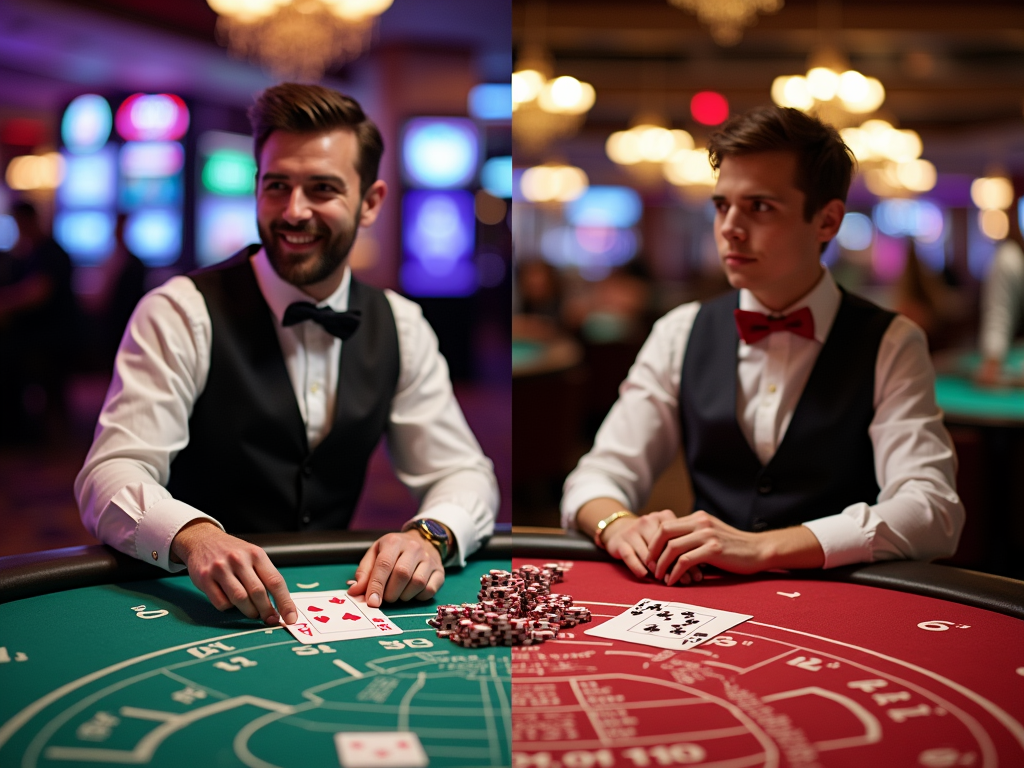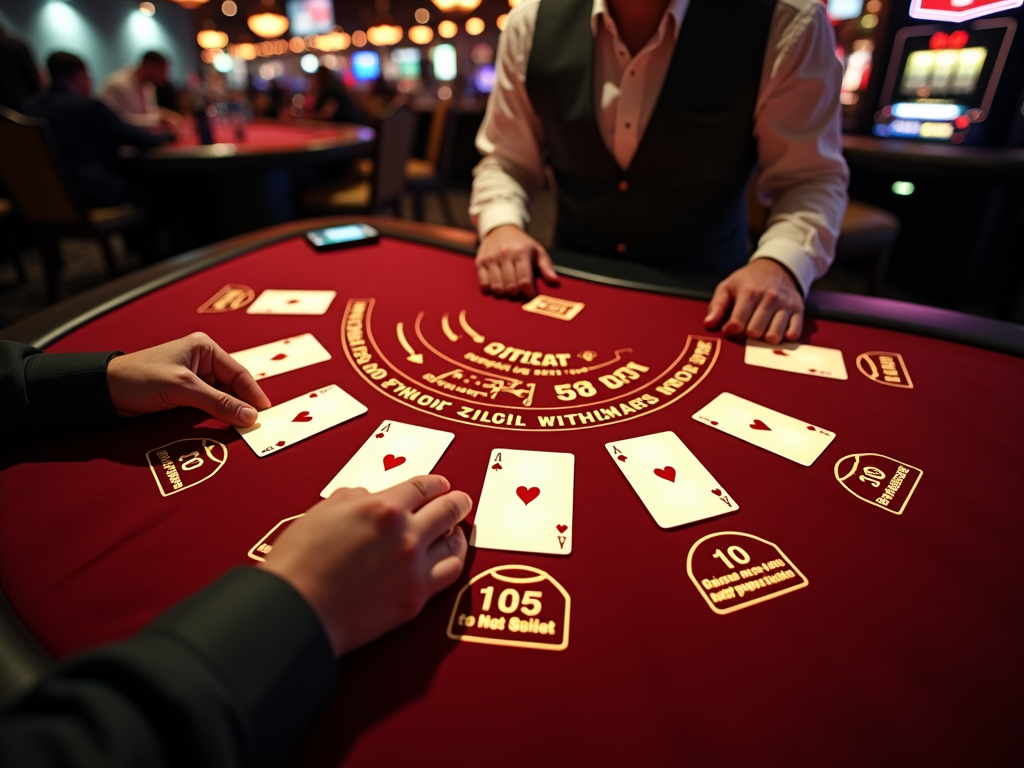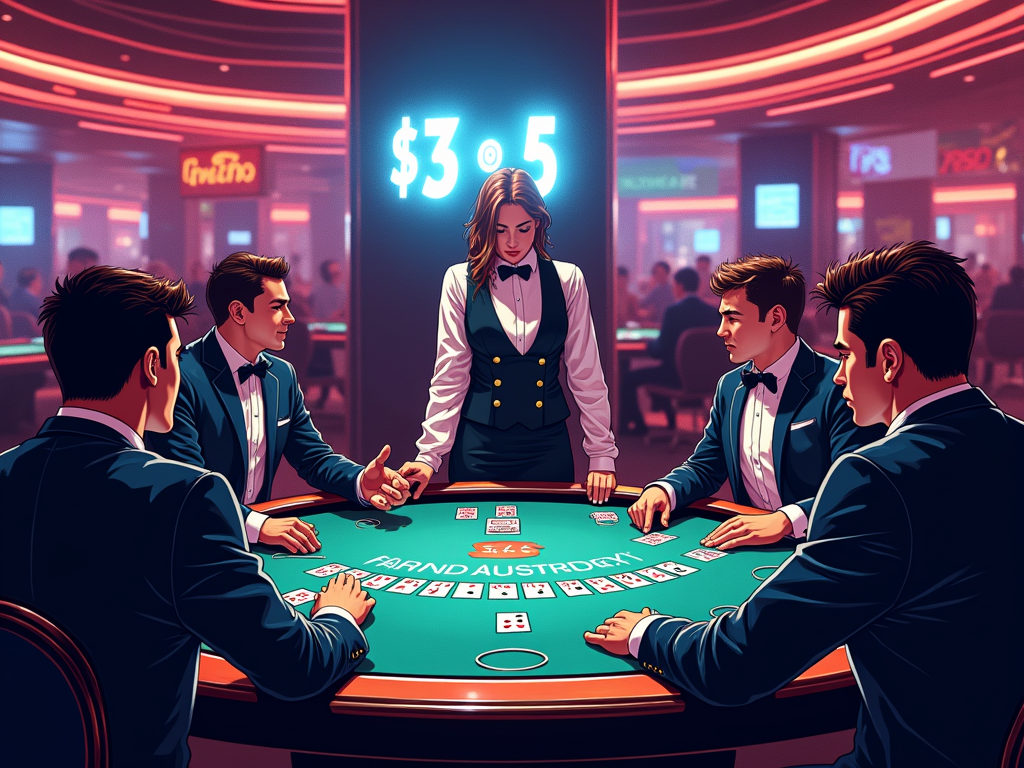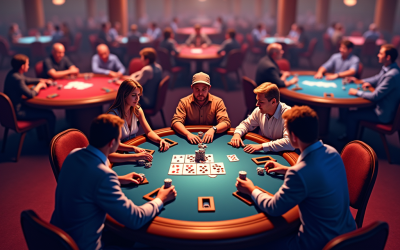Mastering Blackjack Strategy for Winning Sessions
Winning at blackjack demands mastery of mathematical principles and strict adherence to proven strategies. My approach focuses on making smart choices that protect your bankroll while maximizing profit potential at the tables.
Key Takeaways
- Never play at 6:5 payout tables – they increase the house edge by 1.39% and significantly reduce potential winnings.
- Always follow basic strategy decisions rather than gut feelings to maintain the lowest possible house edge of 0.5%.
- Skip insurance bets unless you’re an expert card counter – they carry a massive 7% house edge.
- Split pairs strategically – always split Aces and 8s, but never split 10s or 5s.
- Practice proper bankroll management by limiting bets to 1-2% of your total funds and setting clear win/loss limits.
Disciplined Strategy Implementation
I’ve learned through experience that disciplined strategy implementation makes the difference between profitable sessions and costly mistakes. Proper table selection forms the foundation – I exclusively play at 3:2 payout tables rather than the inferior 6:5 games that eat into profits. My strict adherence to basic strategy keeps the house edge at its minimum of 0.5%.
Smart Bankroll Management
Smart bankroll management combines with strategic gameplay to create sustainable advantages. I limit individual bets to 1-2% of my total funds and establish firm win/loss thresholds before each session. This calculated approach prevents emotional decisions from derailing proven tactics.
Why Playing at 6:5 Blackjack Tables is Costing You Money
The difference between 3:2 and 6:5 blackjack payouts might seem small at first glance, but it’s actually costing you serious money. Let me break down exactly how much you’re losing by playing at these modified tables. With traditional 3:2 payouts, a $10 blackjack bet wins you $15. However, at 6:5 tables, that same winning hand only pays $12 — that’s a $3 difference every single time you hit blackjack.
The Hidden Cost of Modified Payouts
This seemingly minor adjustment makes a massive impact on your chances of winning. I’ve found that 6:5 payouts boost the house edge by roughly 1.39%, which can quickly drain your bankroll. Think about it — if you’re playing 100 hands per hour and hit blackjack about 4–5 times during that period, you’re missing out on $12–15 in potential winnings every hour.
Before starting your session, I recommend taking these essential steps to protect your bankroll:
- Check the table signage carefully for payout ratios
- Ask the dealer directly about blackjack payouts if you’re unsure
- Scout multiple tables to find 3:2 options
- Be prepared to change casinos if necessary to find better odds
As I explain in my complete guide to casino table games, understanding payout structures is crucial for maximizing your winning potential. Just like implementing proper betting systems and strategies, choosing the right table with favorable rules directly impacts your bottom line.
Many players overlook these modified payouts, focusing instead on other aspects of the game. But I can’t stress enough how important it is to stick to traditional 3:2 tables. While 6:5 tables might have lower minimum bets or seem more appealing at first, they’ll cost you significantly more money in the long run.
The math is clear — playing at 6:5 tables essentially hands the casino an extra advantage that’s totally unnecessary. Even if you’re using perfect basic strategy, this modified payout structure makes it nearly impossible to maintain a profit over time. I always tell players that if they can’t find a 3:2 table, they’re better off waiting or finding a different casino rather than settling for these inferior odds.

The Million-Dollar Basic Strategy Mistake
Understanding the True Cost of Strategy Errors
Basic strategy is your strongest weapon at the blackjack table. By sticking to these mathematically proven moves, you’ll keep the house edge at a slim 0.5% in games with good rules. But here’s the kicker – straying from basic strategy, even just sometimes, can pump that edge up by 2% or more. That’s like throwing money away with both hands.
I’ve seen countless players make decisions based on gut feelings or hot streaks, but that’s not how you win at blackjack. Take the classic example of holding a hard 12 against a dealer’s 2 or 3. Most players freeze up and stand, thinking it’s safer. But basic strategy tells us to hit – and there’s solid math backing this up.
Key Strategy Deviations That Cost Players
Let me break down some costly mistakes I regularly spot at the tables. Here are the moves that can seriously damage your bankroll:
- Standing on hard 12 against dealer’s 2 or 3 (when you should hit)
- Splitting 10s because you’re “feeling lucky”
- Taking insurance bets without card counting skills
- Not doubling down on 11 against a dealer’s weak upcard
- Standing on soft 18 against dealer’s 9, 10, or Ace
These aren’t just minor slip-ups – they’re bankroll killers. Each deviation from optimal blackjack strategy chips away at your chances of winning.
The solution is straightforward: learn basic strategy cold. I recommend practicing with strategy charts until the correct plays become second nature. Think of it like learning a new language – at first, it seems overwhelming, but with practice, it becomes automatic.
Remember, basic strategy isn’t about following rules blindly – it’s about making decisions backed by probability and mathematics. Just like in other casino games where betting systems matter, your success in blackjack depends on disciplined adherence to proven strategies.
Every time you’re tempted to trust your gut over basic strategy, remember this: the casino’s edge is built into every hand. Your job isn’t to outsmart the game – it’s to minimize losses through consistent, mathematically sound play. That’s how you stay in the game longer and give yourself the best shot at walking away ahead.

Never Take Insurance (Even When It Seems Smart)
I’ll be direct – insurance bets are a trap that smart blackjack players should skip. While that 2:1 payout might catch your eye when the dealer shows an Ace, the math tells a different story.
The True Cost of Insurance
In standard six-deck games, insurance carries a hefty house edge of over 7%. That’s a massive disadvantage compared to the mere 0.5% house edge when playing basic strategy blackjack correctly. Even if you’re sitting pretty with a natural blackjack, taking “even money” (which is really just an insurance bet in disguise) will cost you money over time.
Why Insurance Feels Right But Isn’t
Here’s what makes insurance so appealing but costly for players:
- The psychological comfort of “protecting” strong hands against a dealer’s Ace
- The quick 2:1 payout that seems to offset potential losses
- The false sense of security when the dealer peeks and has blackjack
- The natural instinct to hedge your bets when facing uncertainty
The cold hard truth is that unless you’re an expert card counter who knows the exact deck composition, insurance is a losing play. The odds of the dealer having a ten-value card (needed for blackjack) don’t match up with the 2:1 payout offered by the insurance bet.
Think about it this way – if I’m playing basic strategy without insurance, my expected loss is about 50 cents per $100 wagered. But if I take insurance regularly, that jumps to $7 or more per $100. That’s a costly mistake that can quickly eat away at your bankroll.
For newer players looking to improve their game, I recommend focusing on mastering essential casino game strategies before considering advanced tactics. If you’re interested in optimal betting approaches, you might want to explore proven betting systems instead of relying on insurance bets.
Split or Stick: The Crucial Pairs You’re Playing Wrong
Splitting pairs in blackjack isn’t just about gut feelings – it’s about making mathematically sound decisions that boost your chances of winning. I’ve seen countless players struggle with pair decisions that cost them money at the table. Let’s break down the essential splits you need to master in your card game strategy.
Must-Split Scenarios and Common Mistakes
Aces and 8s are your automatic splits – no exceptions. When you’re dealt Aces, splitting gives you two powerful starting hands with the potential for blackjacks or strong totals. With 8s, you’re breaking up the dreaded 16 into two hands that have better winning potential.
Here are the critical pair decisions that often trip up players:
- Never split 10s – A 20 is already a powerful hand. Breaking it up chases lesser totals and throws away your advantage.
- Don’t split 5s – Your total of 10 is prime for doubling down instead. Splitting ruins this opportunity.
- 2s, 3s, and 7s should be split against dealer upcards 2 through 7.
- Split 6s against dealer upcards 2 through 6.
- Split 9s against everything except dealer 7s, 10s, and Aces.
The math behind these decisions isn’t just theoretical – it directly impacts your bankroll. I’ve found that players who follow these splitting rules see notably better results compared to those who split based on hunches or emotions. Just like mastering betting systems, proper pair splitting is fundamental to skilled blackjack play.
Timing also matters with pair decisions. Don’t rush your choice – take a moment to consider both your cards and the dealer’s upcard. This quick pause helps avoid costly splitting mistakes that can drain your bankroll.
Each pair presents unique opportunities and risks. For example, splitting 9s gives you two strong starting hands of 9, but keeping them together as 18 is sometimes the better play against dealer strong cards. Similarly, low pairs like 2s and 3s become split candidates specifically because of their potential to form stronger hands against dealer weak cards.
Remember, these splitting decisions aren’t suggestions – they’re proven strategies backed by probability calculations. By following them consistently, you’ll make the mathematically correct play every time, maximizing your potential returns over the long run.

Smart Money Management Saves Your Bankroll
Setting Smart Betting Limits
I always tell players that successful blackjack starts with proper bankroll management. Limiting your bets to just 1–2% of your total bankroll per hand helps create a sustainable playing strategy. For example, with a $1,000 bankroll, your standard bet should stay between $10–20 per hand.
To play comfortably and weather the natural ups and downs of the game, your bankroll needs to support 20–50 bets at your chosen stake level. This cushion lets you stay in action longer and avoid going broke from a few unlucky hands. Before starting any session, I recommend writing down clear win goals and loss limits — this simple act creates accountability and helps prevent impulsive decisions.
Avoiding Emotional Betting Traps
Here’s what I’ve learned about the psychological pitfalls that can destroy your bankroll:
- Chasing losses by increasing bet sizes to “get even”
- Going on tilt after a string of bad beats
- Betting more than planned when feeling “lucky”
- Playing longer than intended to try recovering losses
- Ignoring predetermined loss limits in the heat of the moment
The natural variance in blackjack means you’ll experience both hot and cold streaks. Understanding this reality helps maintain discipline during downswings. As I explain in my complete guide to casino table games, smart bankroll management is crucial across all gambling activities.
Rather than trying to force wins, I focus on making mathematically sound decisions based on basic strategy while keeping my bets consistent. This approach, combined with proper betting system fundamentals, gives me the best chance of preserving my bankroll through losing streaks while capitalizing on winning sessions.
Remember that even perfect basic strategy involves a house edge — gambling should never be viewed as a reliable way to make money. By treating blackjack as entertainment and sticking to strict bankroll rules, you’ll extend your playing time while minimizing the risk of significant losses.
Emotions and Superstitions Have No Place at the Table
I’ve noticed that blackjack players who let emotions guide their decisions often make costly mistakes at the table. Each hand is completely independent — what happened in previous rounds has zero impact on what’s about to happen next.
Breaking Free from Common Myths
The classic gambler’s fallacy trips up countless players. After losing several hands in a row, they’ll increase their bets thinking they’re “due for a win.” This flawed thinking leads to poor bankroll management and risky decisions that stray from sound strategy.
Here are the key superstitions and emotional traps to avoid:
- Believing the third-base seat (last to act) controls the table’s destiny
- Blaming other players for “taking” the dealer’s bust card
- Increasing bets after losses to “get back” lost money
- Following “hot” and “cold” streaks that don’t actually exist
- Using lucky charms or rituals to influence the cards
Success at blackjack stems from making calculated decisions based on mathematics, not hunches or feelings. Just like in other casino card games that require strategy, maintaining emotional control is crucial.
I recommend focusing solely on correct basic strategy plays and predetermined betting limits. Ignore the urge to deviate based on what “feels right” or what other players are doing. The cards don’t know or care about your previous hands — they’ll fall according to the laws of probability regardless of your emotional state or lucky rituals.
When you notice yourself getting frustrated after losses or overconfident after wins, take a short break. A clear head helps maintain discipline with both betting and playing decisions. Remember that blackjack rewards logical, consistent play over the long run — not emotional reactions or superstitious behaviors.
Sources:
Wizard of Odds – “Blackjack Basics”
Wizard of Odds – “Blackjack House Edge”
Wizard of Odds – “Blackjack Insurance”
Investopedia – “The Basics of the Casino House Edge”
Blackjack Apprenticeship – “6 to 5 Blackjack”





